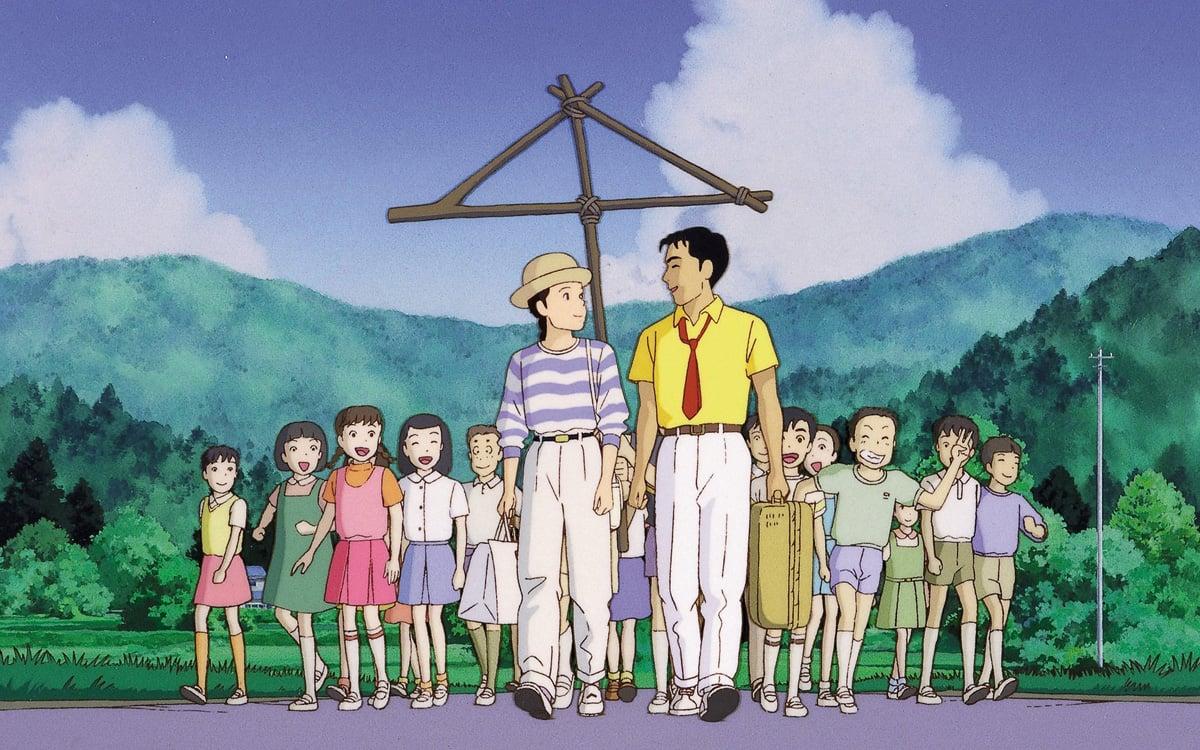
While not as well-known or fantastical as other Studio Ghibli titles like My Neighbor Totoro, Spirited Away, and Ponyo, Isao Takahata’s Only Yesterday is a delightful, unassuming film in its own right. It also happens to have one of the most perfect final scenes I’ve ever watched, one that leaves me choked up every time I see it.
Note: The following contains possible spoilers.

Only Yesterday follows a young woman named Taeko as she travels to the countryside to visit some relatives and work on their farm. Along the way, she begins reminiscing about her childhood, and much of the film’s charm comes from watching young Taeko’s exploits, be it falling in love for the first time, experiencing puberty, or dealing with her family.
Upon arrival, Taeko meets a young man named Toshio, and they hit it off, though Taeko is still caught up in nostalgia. Throughout the film, we watch Taeko wrestling with who she was, who she is, and who she wants to be. Or, as GKIDS’ synopsis puts it, “In lyrical switches between the present and the past, Taeko contemplates the arc of her life, and wonders if she has been true to the dreams of her childhood self.” (There’s also some subtext about how unmarried women are viewed in Japanese culture, which adds some more poignancy to Taeko’s situation.)
All of this comes to a head in the film’s final scene. Taeko is returning to Tokyo when her younger self and her childhood friends suddenly appear and surround her on the train, and silently encourage her to return to the farm (and Toshio). It’s a wonderful blending of fantasy and reality in a film that, for the most part, presents things in a pretty direct, realistic manner. But these surreal few minutes speak volumes about the power of nostalgia, and how life can be a balancing act between letting your childhood continually shape and affect you, and maturing and moving beyond childhood memories and fantasies.
As someone who is prone to nostalgic musings, I always find Only Yesterday’s final minutes deeply moving. On the one hand, it affirms the value and power of nostalgia, of reflecting on who you were and your past experiences, and finding comfort and joy there. On the other hand, it affirms that it’s a good thing to move on and become a better, more mature and fulfilled version of yourself. And doing so means leaving something of your childhood behind — which Only Yesterday depicts in a very lyrical-yet-bittersweet manner.
It’s also worth noting that this scene is one for which animation is the ideal medium; I can’t imagine it working even half as well in live action. Being animated immediately lends it a hyper-reality that heightens the emotional impact. In his review of Satoshi Kon’s Paprika, Grady Hendrix wrote:
Because he’s an animator, and has to draw every sigh, every piece of garbage, every blink of an eye, Satoshi Kon scrutinizes real life more closely than most directors and he doesn’t take anything for granted. When he shows you a woman out by herself in a big city late at night he’s condensing everything real about that situation into three short minutes, putting it under high pressure and tweaking it with animation to kick it slightly off-center. He pulls reality so tightly that when he plays it, it sings.
Though Only Yesterday’s understated melodrama is a far cry from Paprika’s nightmarish visions, Hendrix’s words hold just as true for Takahata’s film: “He pulls reality so tightly that when he plays it, it sings.” There’s not a single wasted moment in Only Yesterday’s ending sequence, and it’s animated simply and beautifully, and not without some humor (watch the kids’ various shenanigans).
(Speaking of singing, yes, that is a Japanese version of “The Rose” playing in the background, sung by Miyako Harumi. As much as I love the scene, I always find the song a bit off-putting at first, but it contains a pathos that is quite fitting.)
While I’ve always enjoyed Only Yesterday, it acquired an extra layer of meaning when I saw it at the 2007 Cornerstone festival as part of the “Flickerings” film program. It had been several years since I’d been to Cornerstone, and I was experiencing an overwhelming amount of nostalgia as I wandered around the festival grounds that year. Only Yesterday was perhaps the perfect film to watch in that context. As I wrote in my festival notes:
In many ways, I felt like Taeko. When I came to Cornerstone this year, my “old” Cornerstone self tagged along, and much of the fest was spent reliving past fests as I walked around, attempting to reconcile my nostalgia for the fests of yore with the way I am now, and the way I was experiencing this year’s fest.
Only Yesterday doesn’t appear to be coming anywhere close to Lincoln during its upcoming theatrical run. Which is just as well. As much as I love seeing Studio Ghibli films on the big screen, I’m not sure I’d enjoy being reduced to an emotional mess in the theatre — which would almost certainly happen as soon as young Taeko emerged from behind the train seats to encourage her 27-year-old self to move on to something bigger and better in her life.